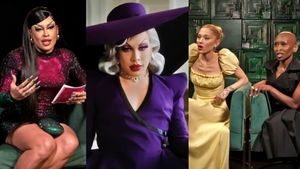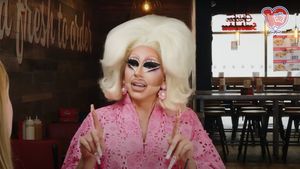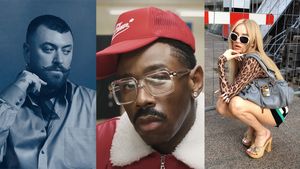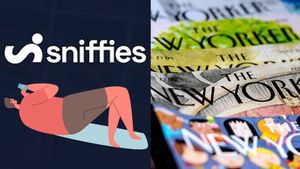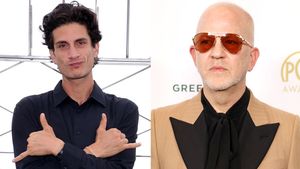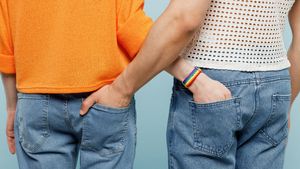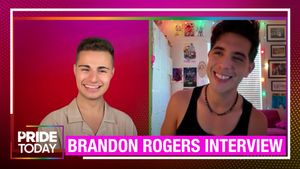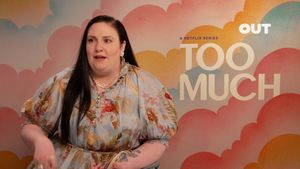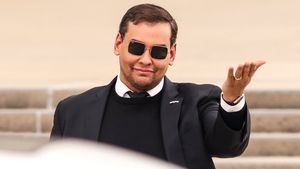We're Here, premiering April 23 on HBO, stars Bob the Drag Queen, Eureka O'Hara, and Shangela Laquifa Wadley. In the network's first unscripted series, the trio of Drag Race alumni recruit and mentor smalltown residents as they perform together in one-night-only drag shows.
We're Here showcases people who stretch across the LGBTQ spectrum, exploring just how different the LGBTQ experience can be depending on where a person lives. Speaking to The Advocate, Bob The Drag Queen tells us what drew her to the new show, how RuPaul's Drag Race has changed how we think about drag, and the one thing she wants to do when the quarantine ends.
JM: Why did you want to be a part of We're Here?
BDQ: The creators of the show approached me and after hearing the full concept of it, I just felt like the show had a lot of integrity and a lot of truth to it.
And after hearing that there would be lots of people across the gender and the identity spectrum, I thought to myself, I would like to be a part of this. This sounds great.
JM: I think an interesting part is that you're also putting non-queer people into drag, some who haven't always identified as "allies."
BDQ: I'm kind of intrigued by how many people are so intrigued by that. I don't want to give the spin or the narrative that the show is us putting a bunch of straight people in drag because it's not. Most of the people we can put in drag do identify as queer. I just want to put that out there because I don't want anyone thinking this is one of those gays going around the country helping straight people stories.
I think that the idea of putting a straight person in drag, it's not new. We didn't invent it. It's been done quite a few times before we got around to it.
JM: The show also always has a reason for putting the few straight people I saw in drag.
BDQ: That's the thing. Everyone we're working with has a different story. It's not like every time we put a straight person in drag, it's for the exact same reason.
And every time we put a gay person in drag, it's not for the same reason. Every time we put a trans person in drag, it's not for the same reason. There's different reasons for different people. I think everyone is getting something different out of it.
JM: The show explores different LGBTQ people's experiences in small towns. What was your experience like in these places?
BDQ: So, that's the thing, I actually traveled around a lot before doing this show, so being in a small town as a queer black person isn't really new to me. I've been in small towns everywhere from the U.K. to Alabama. But also I grew up in small towns, so it didn't feel completely unique. There hasn't been a whole lot of culture shock for me in regards to this show.
JM: We talk a lot about how Drag Race has changed drag, usually in big cities. How has it changed drag in smaller towns?
BDQ: I will say this, to do drag on a television level where it's going to be consumed by many, drag has gotten a lot better. The industry itself has grown: the designers, the makeup companies who make makeup geared toward drag queens, the wig companies that are making wigs geared toward drag queens. They're all stepping up their game because they're all competing with each other.
And the queens themselves are like, "Well, how can we stand out?" So, each queen is just getting better and better. I know that I've improved a lot even since I was on Drag Race.
JM: Do you see the bar being raised for queens who are not on TV?
BDQ: I think that is really individual based on each queen. There are some queens who just don't have the resources to get much more than hand-me-downs or they don't have the skillset to make their own clothes.
I like to lean into whatever makes a queen special and unique. I'm more interested in highlighting those things as opposed to pointing out what you can't do because no one can do everything.
JM: What did you highlight when you were beginning?
BDQ: I wasn't super great at makeup or anything before now. But when I was in New York City, people didn't come to gawk at how bad my makeup was. They were just saying, "Wow, you're really funny and I like your shows."
I find that to be the case in all these towns. There were some queens in some of these towns that I was like, "Ooh, wow, this is not the most aesthetically pleasing drag," but their communities were focused on what they do really well.
JM: How often are you getting into drag now that you're staying home?
BDQ: Maybe around once a week. Not much more than that. I'll make a video for YouTube or I'm in the Digital Drag Fest and stuff like that, but less frequently than normal.
JM: Do you miss it?
BDQ: I've done a lot of drag in my day, so I'm not craving or fiending for my next hit of drag because I know when it's coming. It's coming in a couple of days, actually. No, I don't feel any withdrawals at this moment. I'm not scratching to put on a wig or anything, you know?
JM: Do you miss having a live audience?
BDQ: Well, that I do miss. I do miss coming out to a crowd, coming out to applause, seeing people's faces, being able to get in close proximity to an audience member. Yeah, that I certainly do crave and miss.
JM: How much are you working or focusing on your career right now?
BDQ: I am one of the people trying to be productive, but also, if you want to just sit back; whatever you need to do during your quarantine to keep yourself sane and going, then you do that.
I know for me, when I first got into quarantine, I was like, "I have got to work out." And then I was like, "Oh my god, my apartment's a mess. I've got to fix and clean and move the couch." I moved the couch and looked behind it for the first time in probably a year. And then I was like, "I've got to make content." Then I was like, "I've got to shave my head." So, I went through all of the things as well, but I'm someone who really likes to keep busy.
I've also been maintaining relationships with people. I've been talking on the phone a lot more than I ever have, FaceTiming a lot more than I ever have. I talk to my mom and every single day.
JM: Have you ever had this much downtime?
BDQ: What has it been? Three weeks now? No. I think the longest I've been off before this was probably two weeks and now we are at four weeks, actually. So, yeah, no. This is the most time I've had off. But it's also not time off because I'm still creating content and working, you know?
JM: How much behind-the-scenes work do you do that we don't see?
BDQ: Yeah, that's interesting. I produce content for a few people, actually, between Peppermint and Marti Gould Cummings and different local queens in New York City. Sometimes I write for other drag queens. It's usually just in the drag world.
They haven't really quite discovered me outside the drag world. But as a comedian and a writer, I'll write jokes for people, help people come up with their shows. So, I guess, a lot more than people would think.
JM: Do these queens pay you or do you do it just because you like them?
BDQ: Oh, no, these bitches are giving me money. I'm not writing for these hos for free.
JM: What are you some of the shows or jokes you've written?
BDQ: Trinity Taylor and Ginger Minj both went on one of these big roast tours where the comedians all make fun of each other and I wrote their sets for that. Sometimes I help Monet X Change punch up jokes for her show, The X Change Rate. I don't charge Monet because she's my best friend. I also coached Naomi Smalls through her Snatch Game when she went back for All Stars, stuff like that.
JM: After this is all over, what's on top of your to do list?
BDQ: Once I get my schedule back in order, I'll figure out where I'm going next. I had a tour coming up after this. Me and Monet X Change were going to be doing the Sibling Rivalry Live Tour. I'm hoping that I can still go do that and meet fans. Obviously, no touching. No touching, wear masks, wear gloves.
JM: Has the pandemic had an effect on what you want your career to look like in the longterm?
BDQ: No. Not so much. I've always been interested in producing and doing behind the scenes work and I've now had a little bit more time to do it.
Because there are people doing these online drag shows now, I'm considering doing more of those. A lot of the people in the comments section are people who are saying, "I never could go to drag shows because of whatever my circumstance is." Maybe they don't have enough money, maybe they don't have access, maybe they're disabled, maybe they have anxiety. And now they're like, "I can finally watch drag shows and this has been really life-changing." So, I'm hoping that maybe I can continue something for people who are in those situations too.
JM: You make a big effort to highlight non-Drag Race queens in your work.
BDQ: Oh, yeah. It's really important to me. These girls have lost their income. I lost my income too. But I know what it's like to be a local queen who's working gig to gig and once the gigs clear up and your little bit of reserve disappears, you don't know what you're going to do. I understand that feeling. I wouldn't want to be in this situation myself, so if I can help someone, I'm happy to.
We're Here with Bob The Drag Queen premieres on April 23 on HBO.
(RELATED: Eureka O'Hara Shares Her Personal Journey With Gender)








